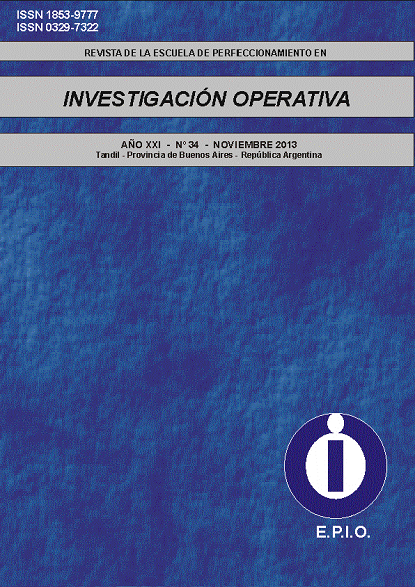Hyperheuristics based on reasoning with mastery in metaheuristics x-pso multiobjective hy x-fpso cbr. Application on a dynamic optimization of possibilities part 1) theoretical developments of the hyperheuristic algorithm hy x-fpso cbr
Keywords:
optimization, particles swarm, HyperHeuristics, artificial neural network, electric distribution systemAbstract
In this work the conceptual/theoretical framework of a novel HyperHeuristic, Case Based Reasoning and supported on some variants of MultiObjective Particle Swarm Optimization MetaHeuristic, called X-PSO, are presented.
This HyperHeuristic, referred as HY X-FPSO CBR (Case Based Reasoning), works by mean of selection function, aproximated with an Artificial Backporpagation Neural Network. To design and, especially, training the Artificial Neural Network, Swarm Intelligence Principles and the skill that each X-FPSO form exhibit to satisfy it, as well as the Search Space that is defined by the Problems Class to solve, are considered. This HyperHeuristic are designed to be applied in the definition of States Space required for a Possibilistic Optimization on the Mid/Short term Planning of a Electric Distribution System (EDS).
Downloads
References
BAI R. Y KENDALL G. (2006): ?An Investigation of Automated Planograms Using a Simulated Annealing Based Hyper-Heuristic?. GECCO’06, July 2006, Seatte, Washington, USA.2005.
BELLMAN R. Y ZADEH L. (1970): ?Decision-Making in a Fuzzy Environment?. Management Science, 17, pp. 141-164.
BENI G., WANG J. (1989): ?Swarm Intelligence in Cellular Robotic Systems?. Proccedings NATO Advanced Workshop on Robots and Biological Systems, June 1989, Tuscany, Italy.
BLACK P. (2009): ?Dictionay Of Algorithms and Data Structures?. National Institute of Standars and Technology. Versión obtenida el 1/06/2009. http://www.nist.gov/index.html.
BURKE E., KENDALL G., O’BRIEN R., REDRUP D., SOUBEIGA E. (2003-c): ?An Ant Algorithm Hyperheuristic?. The Fifth Metaheuristics International Conference. Kyoto, Japan, August 2003.
BURKE E., KENDALL G., SOUBEIGA E. (2003-a): ?A Tabu-Search Hyperheuristic for Timetabling and Rostering?. Journal of Heuristics, No 9, pp. 451-470.
BURKE E., LANDA SILVA J., SOUBEIGA E. (2003-b): ?Hyperheuristic Approaches for MultiObjective Optimisation?. The Fifth Metaheuristics International Conference, pp. 052-{1-6}. Kyoto, Japan, August 2003.
BURKE E., MACCARTHY B., PETROVIC S., QU R. (2002): ?Knowledge Discovery in a HyperHeuristic for Course Timetabling Using Case-Based Reasoning?. Proceedings of the Fourth International Conference on the Practice and Theory of Automated Timetabling (PATAT’02), pp. 90-103, Ghent, Belguium, August 2002.
COELLO C., SALAZAR M. (2002): ?MOPSO: A Proposal for Multiple Objective Particle Swarm Optimization?. Proceedings of the 2002 Congress on Evolutionary Computation-CEC02, Vol. 2, pp. 1051-1056. Honolulu, Hawaii USA.
COWLING P., KENDALL G., E. SOUBEIGA E. (2000): A Hyperheuristic Approach to Scheduling a Sales Summit. Selected Papers of the Third International Conference on Practice and Theory of Automated Timetabling, PATAT 2000. LNCS, pp. 176-190, Konstanz, Germany, August 2000. Springer-Verlag.
COWLING P., KENDALL G., E. SOUBEIGA E. (2001): ?A Parameter-Free Hyperheuristic for Scheduling a Sales Summit?. In proceedings of 4th International Conference, Porto Portugal, July 2001, pp. 127-131.
COWLING P., KENDALL G., E. SOUBEIGA E. (2002-a): A Tool for Rapid Prototyping in Scheduling and Optimisation. Second European Conference on Evolutionary Computing for Combinatorial Optimisation, EvoCop 2002. LNCS, pp. 1-10, Kinsale, Ireland, April 2002. Springer-Verlag.
COWLING P., KENDALL G., E. SOUBEIGA E. (2002-b): Hyperheuristic: A Robust Optimisation Method Applied to Nurse Scheduling. Parallel Problem Solving from Nature VII, PPSN 2002. LNCS, pp. 851-860, Granada, Spain, September 2002, Springer-Verlag.
DÍAZ A., GLOVER F., GHAZIRI H., GONZALEZ J. (1996): Optimización Heurística y Redes Neuronales. Paraninfo. Madrid, España.
DORNDORF U. Y PESCH E. (1995): ?Evolution Based Learning in a Job Shop Scheduling Environment?. Computers and Operations Research, 22, pp. 25–40.
FANG H. Y ROSS P. (1994): ?A Promising Hybrid GA/Heuristic Approach for Open-Shop Scheduling Problems?. Eleventh European Conference on Aritificial Intelligence, pp.197–202.
GLOVER F. (1989): ?Tabu Search: Part I?. In: ORSA Journal on Computing, vol. 1, pp. 190-206. KENNEDY J., EBERHART R. (1995): ?Particle Swarm Optimization?, IEEE International Conference on Neural Networks. IEEE Service Center, Piscataway, NJ. Pert, Australia.
KITANO H. (1990): ?Designing Neural Networks using Genetic Algorithms with Graph Generation System?. Complex Systems, 4, pp. 461–476.
LAVOIE, M. (1992). Foundations of PostKeynesian Economic Analisys. Edward Elgar Publishing. University of Ottawa, Canada.
NORENKOW I. Y GOODMAN E. (1997): ?Solving Scheduling Problems via Eevolutionary Methods for rule Sequence Optimization?. Second World Conference on Soft Computing, pp. 61–64.
OSMAN I. Y KELLY J. (eds.) (1996): Meta-Heuristics: Theory and Applications. Ed. Kluwer Academic. Boston, USA.
PETROVIC S., QU R. (2002): ?Case-Based Reasoning as a Heuristic Selector in a Hyper-Heuristic for Course Timetabling Problems?. Knowledge-Based Intelligent Information Engineering Systems and Allied Technologies, Proceedings of KES’02, Vol 82, pp. 336-340, Crema, Italy, September 2002.
ROSS P., SCHULENBURG S., MARÍN-BLÁZQUEZ J., HART E. (2002): ?Hyper-heuristics: Learning to Combine Simple Heuristics in Bin-Packing Problems?. Genetic And Evolutionary Computation Conference (GECCO 2002), New York, July 2002.
SCHWEICKARDT G. Y MIRANDA V. (2010): ?Metaheuristica FEPSO Aplicada a Problemas de Optimización Combinatoria: Balance de Fases en Sistemas de Distribución Eléctrica?. Revista Ciencia Docencia y Tecnología, Universidad Nacional de Entre Ríos, Nro. 40, pp. 133-163.
SCHWEICKARDT G., MIRANDA V., GIMENEZ J. (2010): ?Dos Enfoques Metaheurísticos para resolver Problemas de Optimización Combinatoria Multicriterio: Fuzzy Evolutionary Particle Swarm Optimization con Topología Estrella Globlal/Individual (FEPSO GIST) y Fuzzy Simulated AnneaLing (FSA)?. Anales del Enecuentro XXIII ENDIO - XXI EPIO - II ERABIO, Tandil, Argentina.
SIMPSON P. (1992): Foundations of Neural Networks. Artificial Neural Networks. IEEE Press. New York.
SMITH J. (2002): Parallel problem solving from nature VII. Granada, Spain. Springer-Verlag.
TCHEPRASOV V. Y GOODMAN E. (1996): ?A Genetic Algorithm to generate a Pro-active Scheduler for a Printed Circuit Boad Assembly?. First International Conference on Evolutionary Computation and its Applications, pp. 232–244.
Downloads
Published
Issue
Section
License
Atribución — Usted debe dar crédito de manera adecuada, brindar un enlace a la licencia, e indicar si se han realizado cambios. Puede hacerlo en cualquier forma razonable, pero no de forma tal que sugiera que usted o su uso tienen el apoyo de la licenciante.
NoComercial — Usted no puede hacer uso del material con propósitos comerciales.
CompartirIgual — Si remezcla, transforma o crea a partir del material, debe distribuir su contribución bajo la misma licencia del original.







